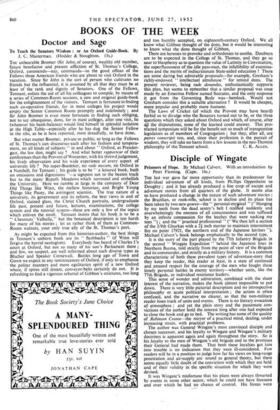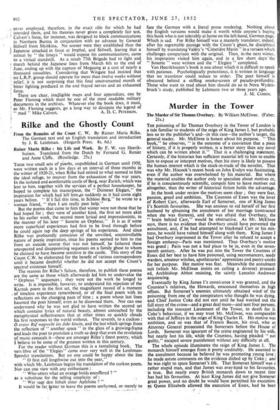Disciple of Wingate
THE last war gave far more opportunity than its predecessor for individual adventure of all kinds, from Philips Oppenheim to Doughty ; and it has already produced a fine crop .of escape and adventure stories from all quarters of the globe. It seems also to have produced a change in the nature of such adventure stories : the Brazilian, or rook-rifle, school is in decline and its place has been taken by two new genres—the" personal-mygical " ("Hanging by my teeth from the dead sentry's belt I realged suddenly and overwhelmingly the oneness of all consciousness and was suffused by an infinite compassion for the leeches that were sucking my toes ") ; and the " practical professional " ("We then left a section of the 3/9th Ghurkas with a 2{ inch mortar to maintain intermittent fire on point 17921, the northern end of the Japanese latrines "). Michael Calvert's book belongs emphatically to the second type.
It is the story of the part played by the 77th Infantry Brigade in the second " Wingate Expedition " behind the Japanese lines in Northern Burma, told strictly from the point of view of the Brigade and its commander, and strictly as a military history. It is a common characteristic of both these prevalent types pf adventure-story that they keep the reader, this reader at least, in a state of continual and amazed respect for the courage of the men who fought these lonely personal battles in enemy territory—whether units, like the 77th Brigade, or individual resistance leaders.
This sense of wonder and admiration, combined with the sheer interest of the, narrative, makes the book almost impossible to put down. There is very little pictorial description and no introspective philosophy or acute political interpretation ; the action is often confused, and the narrative no clearer, so that the non-military reader loses track of units and events. There is no literary evocation of atmosphere ; and yet the plain story and the passionate con- victions of the author hold the interest long after one had expected to close the book and go to bed. The writing has some of the quality of Robinson Crusoe—the mirror of a practical mind, dealing, under increasing strain, with practkal problems.
The author was General Wingate's most convinced disciple and chosen successor, and his loyalty to Wingate and Wingate's military doctrines is apparent again and again throughout the story. So is his loyalty to the men of Wingate's old brigade and to the promises their General had made them. That both these loyalties got him into trouble is no indication that they were ill-considered. Few readers will be in a position to judge how far his views on long-range penetration and air-supply are sound as general theory, but there seems equally little doubt of the conviction with which they are held and of their validity in the specific situation for which they were devised.
It was Wingate's misfortune that his plans were always thwarted by events in some other sector, which he could not have foreseen and over which he had no chance of control. His forces were never employed, therefore, in the exact role for which he had intended them, and his theories never given a completely fair test. Calvert's force, for instance, was designed to block communications in Northern Burma in conjunction with an advance by General Stilwell from Myitkina. No sooner were they established than the Japanese attacked in force at Imphal, and Stilwell, fearing that a retreat by " the limeys " would expose his communications, came to a virtual standstill. As a result 77th Brigade had to fight and march behind the Japanese lines from March 6th to the end of June, ending up with the capture of Mogaung at a cost of nearly a thousand casualties. Considering that Wingate had insisted that no L.R.P. group should operate for more than twelve weeks without relief, it is not surprising that this final uncovenanted month of bitter fighting produced in the end frayed nerves and an exhausted force. There are clear, intelligible maps and four appendices, one by Peter Fleming which must be one of, the most readable military documents in the archives. Whatever else the book does, it must, as Mr. Fleming suggests, go a long way to dissipate the legend of " mad " Mike Calvert. A. D. C. PETERSON.



































 Previous page
Previous page